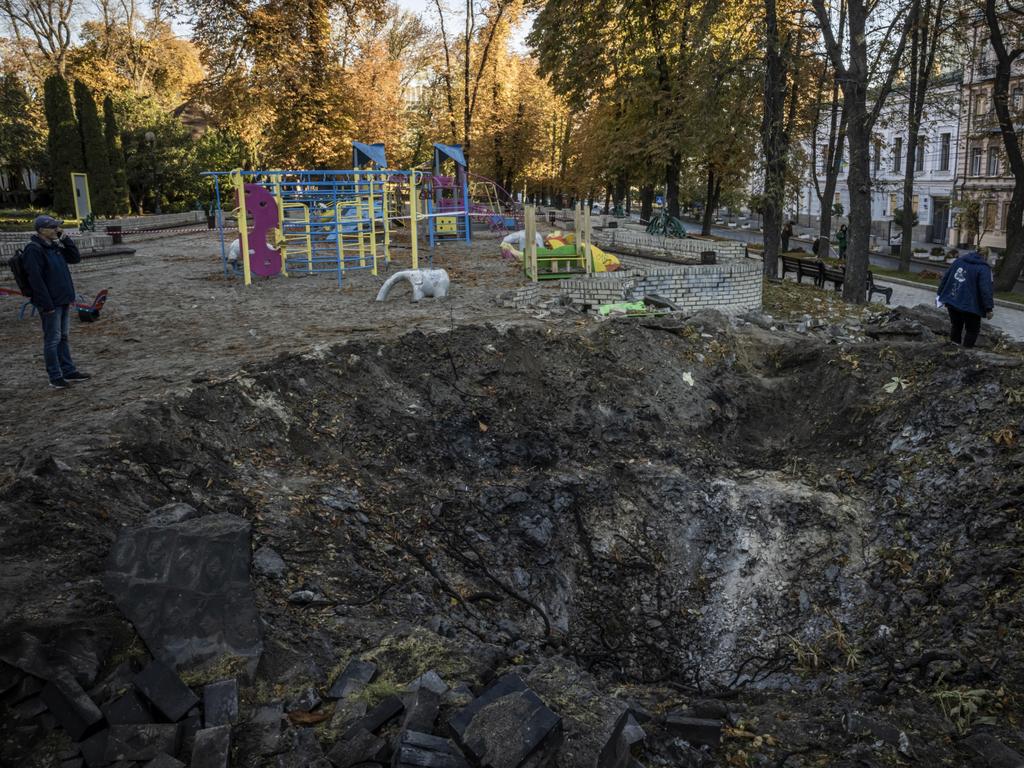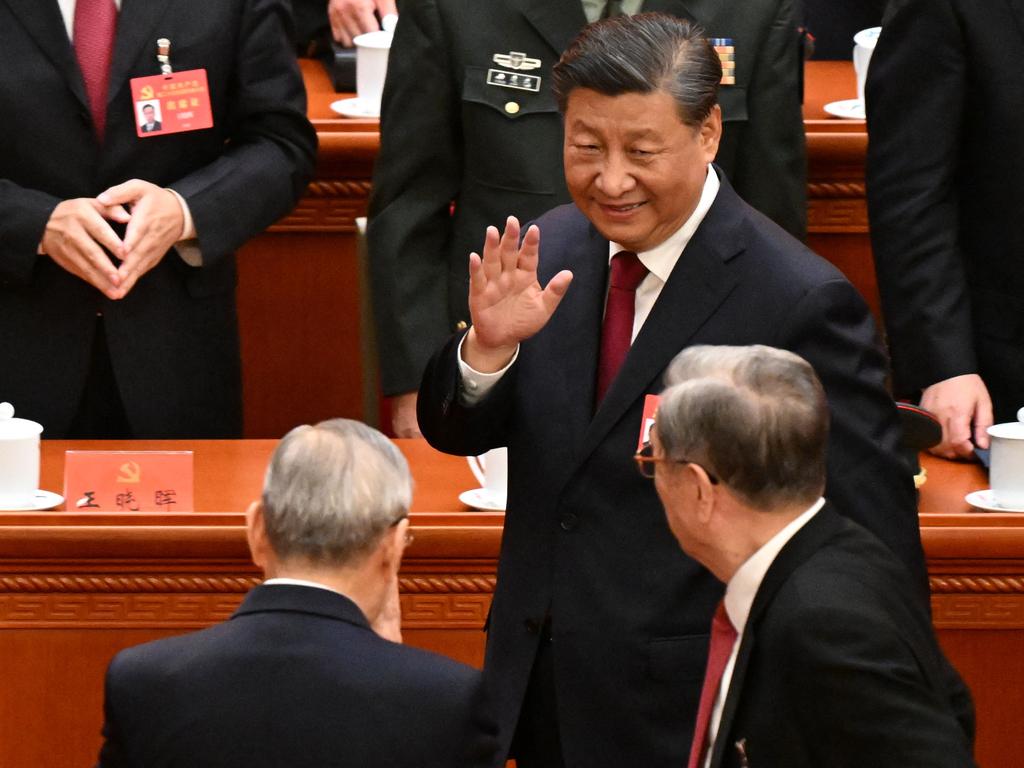
The Chinese leader is not invading a neighbour, raining down missiles on innocent civilians or routinely threatening to use nuclear weapons. Xi is not only more powerful than Putin but also more capable. The two are strikingly different in presentation. Yet there is a great deal of overlap in their respective world views.
Xi’s speech to the 20th Chinese Communist Party Congress was in some respects bland, platitudinous, long on ornate and slightly Delphic Communist Party ideological formulations, reminiscent of George Orwell’s image of a Meccano set of prefabricated phrases artificially bolted together. Yet it was inherently hard-line.
China’s military forces must be ever more “combat-ready”. While Beijing would seek peaceful unification with Taiwan, it would never give up the use of force; that is, invading Taiwan, just as Putin is invading Ukraine. One difference is that a bit over 30 years ago, communist Moscow ruled Ukraine, whereas Taiwan has never been ruled by communist Beijing.

Elements of Xi’s marathon speech were contradictory. Xi said: “Development is the (Communist) Party’s top priority.” Yet he celebrated the dominant role of the party, and the state, in the economy.
Xi’s speech can be seen as a not entirely successful, or at least somewhat confusing, attempt to reconcile the central contradiction in Chinese policy since the death of Mao Zedong in 1976 and the beginning of the reform era in 1978. That contradiction is this: the Chinese Communist Party is completely dedicated to maintaining, indeed, extending, Leninist control over all aspects of Chinese life, yet the party also wants a modern economy.
This must involve some economic freedom and autonomous commercial decision-making. Such freedoms contradict the Leninism at the heart of the party.
Balancing that contradiction has been the story of modern Chinese government policy.
Kevin Rudd, in a series of insightful essays on Xi, categorises him as an “ideological fundamentalist”. Rudd is right.
This is the chief disagreement I’ve had, since I lived for a while in China in 1985, with much modern Sinology and, until five minutes ago, the overwhelming bulk of modern Australian attitudes to the People’s Republic of China. The government of modern China is pre-eminently, at its essence, communist – that is, a government that really, truly believes in Marxism-Leninism.
In his 10 years so far at the top, Xi has taken many decisions, in fealty to Marxism-Leninism and in the interests of maintaining absolute Leninist power, that have slowed and hurt Chinese economic growth. These include his continued zero-Covid policies; the increased isolation of Chinese society from international influences; the severe curtailing of the internet; the moves against hi-tech entrepreneurs; the reassertion of state leadership in the economy; the newly dominant role for Communist Party committees in private firms; the international hostility that hyper-aggressive Chinese diplomacy (recently moderated) has engendered; and much more.

Yet at the same time Xi recognises the need to have a modern, functioning economy.
Here’s a comparison point with Putin. The Russian dictator has also taken a range of decisions that limit or damage Russian economic growth. Chief among those, of course, is the war with Ukraine. But even before the Ukraine invasion, Putin took many actions that made foreign investors wary and that limited Russian economic growth. He did this in part to consolidate his own power, but also to extend the international reach of the Russian Empire.
Geremie Barme, the most brilliant Sinologist to work in Australia in recent decades, thinks the common Stalinist roots of the Chinese and Russian leadership contribute to a good deal of commonality, But more than that, both China and Russia, in Barme’s view, are still working out their post-imperialist identities. Both have comprehensively rejected any idea of liberal democracy and instead are reforging traditional national empires.
For the Russians, the formulation of state purpose going back to the tsars was: God, Tsar and Country. Russia had two brief – tragically brief – moments when democracy seemed possible: for a few months in 1917 when the democratic politician Alexander Kerensky succeeded the tsars before being overthrown by the communists; then for another brief moment when Boris Yeltsin threw off the communists.
Putin was a professional KGB man. Like Xi, he had deep intellectual and operational training in Marxism-Leninism. His 20 years of national leadership have been about trying to reconstitute the Russian Empire. His September 30 speech was paranoid, bitter and more than a bit weird. But it pulled together the ideological constructs of Russian mysticism and exceptionalism, and lip service at least to the spiritual superiority of Russian Orthodox religion (which Putin has savagely traduced). Putin even had the temerity to quote Christ in this speech.
Barme suggests the Chinese equivalent to Russia’s God, Tsar and Country is People, Party and Leader.
Xi, of course, conducts himself in a far more dignified and publicly restrained manner than Putin. This is more orthodox communist behaviour, in which the leader notionally works tirelessly for the people and identifies as part of the proletariat. As Barme wryly observes, Xi has engineered a cult of personality that is all cult and no personality.
But Xi has elevated himself at least to the level of a tsar or a Chinese emperor. People say he is the most powerful leader since Mao. In fact, he is more powerful than Mao. He has more titles. Mao and Deng Xiaoping after him ruled as one-man bands, but they allowed a certain variety of factionalism within the Chinese Communist Party.

Xi has actually made the party, and the entirety of Chinese governance, more brittle by crushing all internal factions and requiring absolute loyalty to him, and of course by abolishing all term limits so that he can effectively be ruler for life.
Chinese official language has even reintroduced a term – yizun – from the time of the first Chinese emperor. It means literally the one tripod. The leader provides the balance to the tripod and also sits at the top of everything.
Marxism-Leninism is often indecipherable to the West partly because it has an entirely different system of metaphysics. It has a radically different view of the nature of humanity, and the purpose of human life, from that which has grown up in the West. It also, like radical Islamism, has an inherent contempt for, and competition with, the West.
Xi and Putin – two leaders forged in a singular tradition. It’s not entirely strange that Xi has described Putin as his “best friend”.








Xi Jinping or Vladimir Putin. Who is your favourite dictator? Which man most faithfully expresses their communist formation?